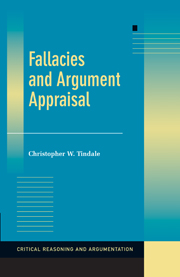Book contents
6 - OTHER ‘AD’ ARGUMENTS
Published online by Cambridge University Press: 05 June 2012
Summary
Introduction
Over time, the arguments ‘ad’, as we might call them, have become quite a sizable group. As a genre they arose with Locke, but logicians have felt free to add to them, particularly throughout the last two centuries. Hence, Hamblin provides a list that includes the argumenta ad fidem (Faith), superbiam (Pride), odium (Hatred), amicitiam (Friendship), invidiam (Envy), and many more. In this chapter, we will explore four of the more frequently occurring ‘ad’ fallacies, the argumenta ad populum (Popularity), baculum (Force), misericordiam (Pity), and Ignorantiam (Ignorance). Then, in the next chapter, we will consider the argumentum ad verecundiam, now treated as the Appeal to Authority, in more detail.
What the ‘ad’ fallacies have in common, besides names derived from Latin terms, is that they are appeals to some contextual factors that characterize the type of argument involved. These factors give some clues to where we might expect to meet them. The ad baculum, for example, often arises in confrontations or arguments in which some kind of power or authority is asserted. The ad misericordiam occurs in contexts in which some special consideration is being sought on emotional grounds. And the ad ignorantiam is frequently found in inquiries in which knowledge claims are being advanced. As does the ad hominem of the previous chapter, these fallacies arise in the processes of argumentation itself.
- Type
- Chapter
- Information
- Fallacies and Argument Appraisal , pp. 104 - 126Publisher: Cambridge University PressPrint publication year: 2007



